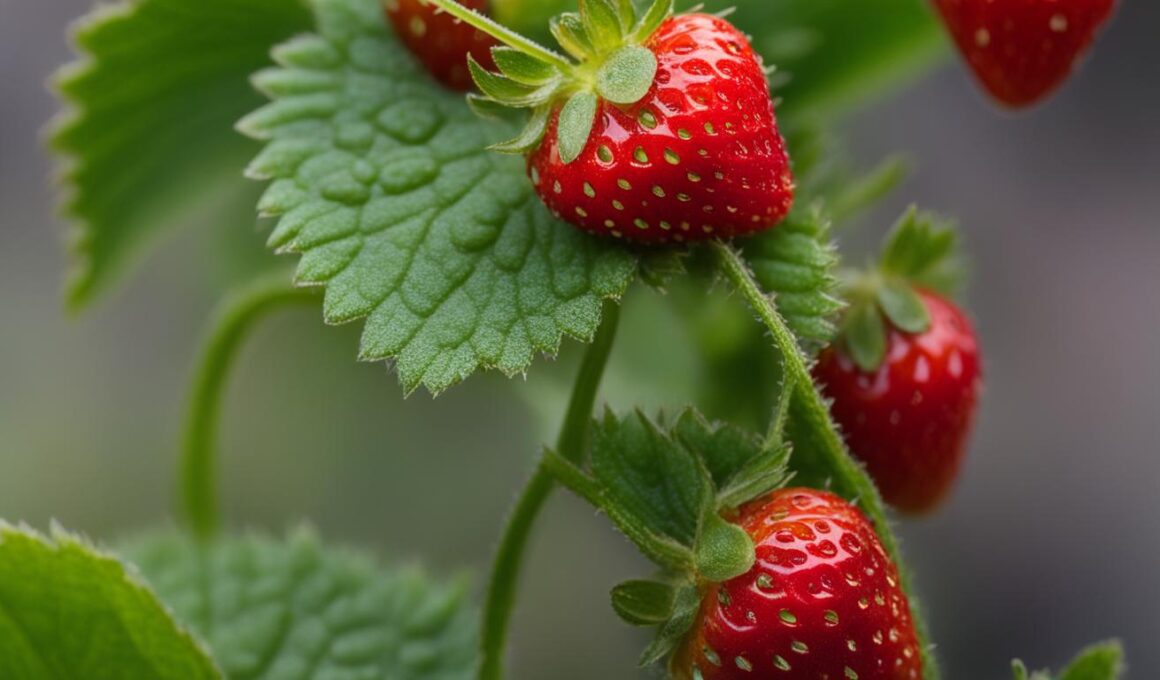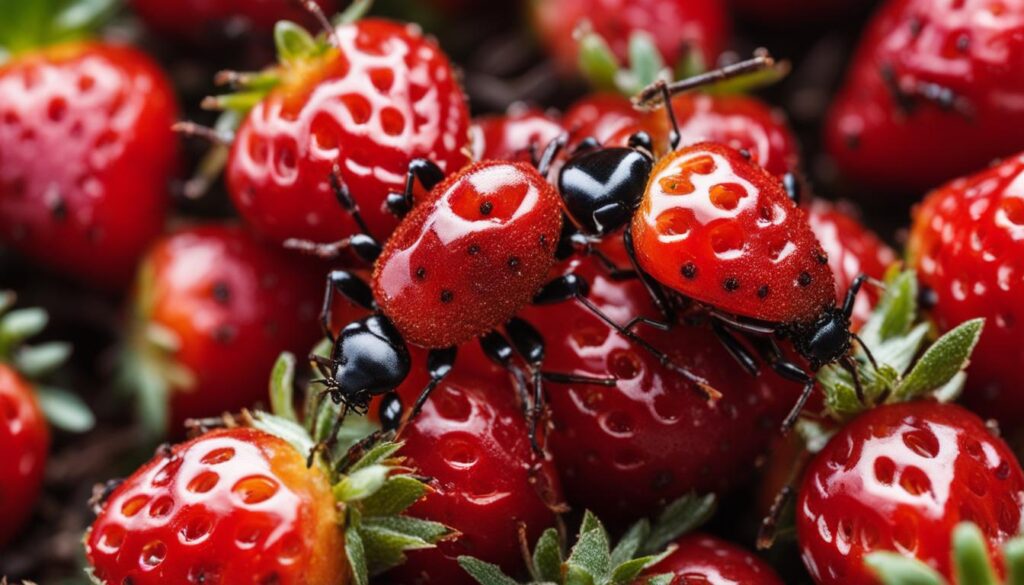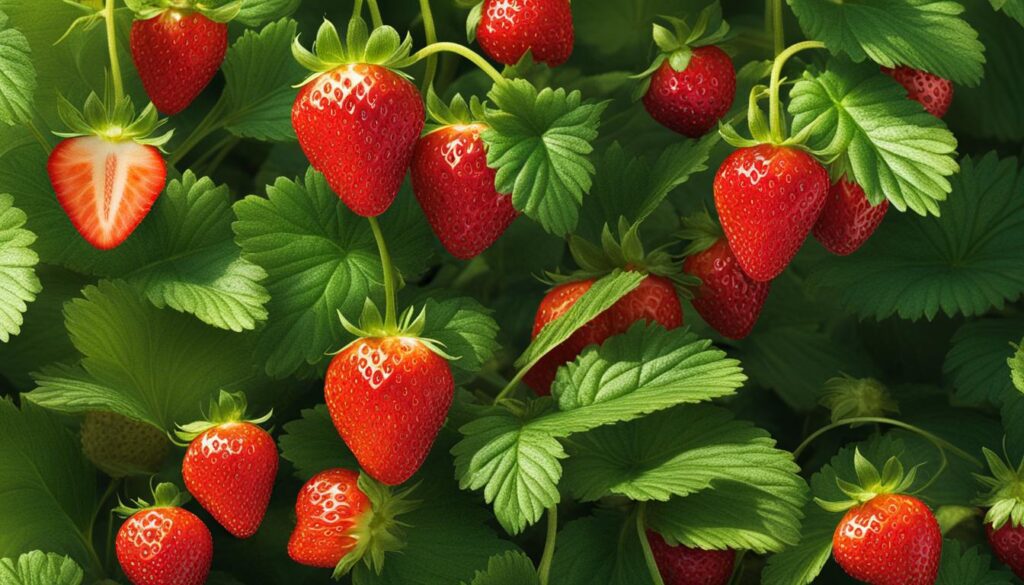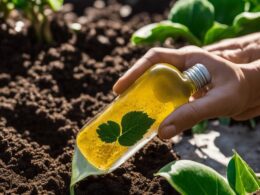Are bugs wreaking havoc on your strawberry plants and ruining your chances of enjoying juicy, pest-free strawberries? Don’t fret – with the right strategies, you can effectively combat these pests and protect your strawberry harvest. In this comprehensive guide, we will provide you with proven methods and tips on how to get rid of bugs on strawberry plants and ensure a bountiful, bug-free harvest.
Post Summary
- Use pine needle mulch to deter bugs and prevent rot.
- Plant strong-smelling herbs like chives and garlic for natural pest control.
- Combat aphids with Garden Safe Insecticidal Soap.
- Provide the necessary nutrients with balanced fertilizers or compost.
- By implementing these techniques, you can enjoy bug-free, luscious strawberries in your garden.
Mulching with Pine Needles to Deter Bugs
Are bugs causing havoc on your precious strawberry plants? Don’t worry, there’s a simple solution to protect your plants and ensure a bountiful harvest – mulching with pine needles. Not only does pine needle mulch provide essential nutrients as it breaks down, but it also serves as an effective deterrent against bugs.
Using pine needle mulch helps keep your strawberry plants off the soil, preventing rot and disease. Simply spread a layer of pine needles around the base of your plants, creating a natural barrier. The acidic nature of the mulch creates an inhospitable environment for pests, effectively keeping them away from your strawberries.
This organic method is particularly effective against bugs that often infest strawberry plants, such as slugs, snails, and aphids. These pesky insects not only damage the plants but also ruin the quality of your strawberries. By mulching with pine needles, you can enjoy bug-free strawberries that are healthy and flavorful.
| Bugs Deterred: | Slugs, snails, aphids |
|---|---|
| Benefits: | Prevents rot, provides nutrients, keeps bugs away |
| Mulch Type: | Pine needles |
| Effectiveness: | High |
Why Pine Needles?
Pine needle mulch is the perfect choice for strawberry plants due to its acidic nature. This acidity helps create an unfavorable environment for pests, deterring them from infesting your plants. Additionally, the acidic mulch provides nutrients to the soil as it decomposes, promoting healthy growth and enhancing the flavor of your strawberries.
Using pine needle mulch not only protects your strawberries from bugs but also enhances the overall health and taste of your harvest. It’s a natural, effective, and sustainable way to ensure the success of your strawberry garden.
So, don’t let bugs ruin your strawberry harvest. Give your plants a fighting chance by mulching with pine needles. The natural barrier and acidic environment will ward off pests, keeping your strawberries safe and delicious.
Planting Strong-Smelling Plants for Pest Repellent
Are bugs wreaking havoc on your strawberry plants and ruining your chances of enjoying juicy, pest-free strawberries? In addition to mulching with pine needles, another effective method to deter pests from your strawberry plants is by planting strong-smelling plants nearby. Chives and garlic, in particular, release strong odors that bugs dislike, creating an inhospitable environment for them. By growing chives and garlic between your strawberry plants, you can naturally repel pests and protect your crop from damage.
Chives, with their onion-like scent, act as a natural pest repellent. The sulfur compounds released by chives repel aphids, slugs, and other common pests that plague strawberry plants. On the other hand, the pungent aroma of garlic is known to repel a wide range of insects, including aphids, spider mites, and Japanese beetles. Planting garlic near your strawberries can help deter these pests and prevent them from causing damage to your plants.
To incorporate chives and garlic into your strawberry garden, simply plant them in close proximity to your strawberry plants. You can place them in rows between the strawberries or in a border around the garden bed. The strong scents emitted by these herbs will permeate the air and discourage pests from approaching your strawberry plants. Not only will you be enjoying the delicious taste of homegrown strawberries, but you will also have the satisfaction of knowing that you achieved natural pest control without the need for harmful chemicals.
So, if you’re looking for a natural and eco-friendly way to protect your strawberries from bugs, consider planting strong-smelling plants like chives and garlic. These pest-repelling herbs not only add flavor to your dishes but also act as a barrier against common pests that can damage your strawberry plants. With their help, you can ensure a healthy and bountiful harvest of pest-free strawberries.
| Pest-Repelling Plants for Strawberry Gardens | Pest Repelled |
|---|---|
| Chives | Aphids, slugs |
| Garlic | Aphids, spider mites, Japanese beetles |
Controlling Aphids with Insecticidal Soap
Aphids can be a real nuisance when they infest your strawberry plants. These small insects feed on the leaves and stems, sucking out the plant’s sap and causing damage to the overall health of the plant. If you notice small, soft-bodied insects on your strawberry leaves, chances are you have an aphid infestation. Luckily, there is a natural and effective way to eliminate these pests and restore the health of your strawberry plants.
Garden Safe Insecticidal Soap is a powerful solution that targets aphids while being gentle on your plants. Made from plant-derived fatty acids, this soap disrupts the cell membranes of aphids, causing them to dehydrate and die. To use Garden Safe Insecticidal Soap, simply mix it according to the instructions on the bottle and spray it onto the affected leaves. Be sure to thoroughly cover both sides of the leaves, as aphids like to hide on the undersides.
Using insecticidal soap is a safe and effective method of controlling aphids on strawberry plants. Unlike chemical pesticides, which can harm beneficial insects and contaminate the environment, Garden Safe Insecticidal Soap is a natural and environmentally friendly option. It specifically targets aphids and does not leave harmful residues on your strawberries, making it safe to eat after application. With regular use, insecticidal soap can help keep aphids at bay and protect your strawberry plants from further damage.
| Aphid Infestation | Insects on Strawberry Leaves | Garden Safe Insecticidal Soap | Natural Aphid Control |
|---|---|---|---|
| A common problem in strawberry plants | Small, soft-bodied insects on leaves | An effective solution for eliminating aphids | A safe and natural alternative to chemical pesticides |
| Causes damage to the overall health of the plant | Feeds on the plant’s sap | Disrupts aphids’ cell membranes, causing dehydration | Does not harm beneficial insects or the environment |
| Prune heavily infested leaves | Thoroughly spray affected leaves | Safe to eat strawberries after application | Helps keep aphids at bay |
Using Fertilizers for Nutrient-Rich Strawberries
If you want to ensure your strawberry plants are receiving the necessary nutrients for optimal growth and fruit production, using fertilizers is essential. Nutrient deficiency in the soil can result in funny-shaped berries and stunted plant growth. By providing the right fertilizers, you can promote healthy strawberry plants and improve the overall quality of your harvest.
One popular option for strawberry plant fertilizers is a balanced 10-10-10 formula. This means the fertilizer contains equal parts nitrogen, phosphorus, and potassium, which are all essential nutrients for plant development. Applying this type of fertilizer according to the package instructions will help replenish any nutrient deficiencies and support robust growth.
“Using a balanced fertilizer with equal amounts of nitrogen, phosphorus, and potassium ensures that your strawberry plants receive a well-rounded nutrient supply,” says gardening expert Sarah Thompson. “This promotes healthy foliage, vibrant flowers, and plump, flavorful strawberries.”
In addition to commercial fertilizers, organic options like compost and blood meal can also provide valuable nutrients to your strawberry plants. Incorporating compost into the soil or adding a layer of compost under the mulch can enrich the soil and improve its fertility. Blood meal, a natural source of nitrogen, can be sprinkled around the plants to boost their growth.
| Fertilizer Type | Benefits |
|---|---|
| 10-10-10 balanced fertilizer | Provides essential nutrients for overall plant growth and fruit production |
| Compost | Enriches the soil with organic matter and nutrients, improving fertility |
| Blood Meal | Boosts nitrogen levels for vigorous plant growth |
Remember, it’s important not to over-fertilize your strawberry plants as excessive nutrients can lead to imbalances and even harm the plants. Follow the instructions provided by the fertilizer manufacturer and monitor the plants’ response to the fertilization. With proper fertilization, you can ensure your strawberry plants have the nutrients they need to thrive and produce an abundant and delicious crop.
Conclusion
With the strategies and tips outlined in this guide, you can effectively get rid of bugs on your strawberry plants and protect your harvest from damage. By implementing these techniques, you can enjoy bug-free, luscious strawberries and make the most of your strawberry garden.
To start, mulching with pine needles is a great way to deter bugs from your strawberry plants. Not only does pine needle mulch provide nutrients to the strawberries, but it also helps prevent rot by keeping the plants off the soil. The acidic nature of the mulch creates an inhospitable environment for pests, keeping them away from your precious strawberries.
Another effective method is planting strong-smelling herbs like chives and garlic near your strawberries. These herbs release strong odors that bugs dislike, naturally repelling them and protecting your crop from damage. By strategically growing chives and garlic between your strawberry plants, you can create an inhospitable environment for pests.
Furthermore, controlling aphids is crucial for the health of your strawberry plants. Pruning heavily infested leaves and using a natural insecticidal soap like Garden Safe Insecticidal Soap can eliminate aphids and restore the well-being of your plants. This method is both effective and environmentally friendly, ensuring the health of your strawberries.
Lastly, providing the necessary nutrients to your strawberry plants is essential for their growth and development. Using a balanced 10-10-10 fertilizer or adding compost and blood meal under the mulch can help address nutrient deficiencies. Nitrogen-rich fertilizers are particularly beneficial for strawberries, promoting healthy plant growth and improving the quality of your strawberries.
By following these techniques and incorporating them into your strawberry gardening routine, you can enjoy bug-free and luscious strawberries. Put these tips into practice, and happy gardening!
FAQ
How do I keep bugs away from my strawberry plants?
One effective method is to mulch with pine needles. Pine needle mulch provides nutrients to the strawberries and helps keep the plants off the soil, preventing rot. The acidic nature of the mulch makes the environment inhospitable for pests, keeping them away from your strawberries.
What plants can I grow to deter pests from my strawberry plants?
Consider planting strong-smelling plants like chives and garlic nearby. These herbs release odors that bugs dislike, creating an inhospitable environment for them. By growing chives and garlic between your strawberry plants, you can naturally repel pests and protect your crop from damage.
How can I control aphids on my strawberry plants?
To combat aphids, prune heavily infested leaves and spray the remaining ones with Garden Safe Insecticidal Soap. This natural and effective solution can help eliminate the aphids and restore the health of your strawberry plants.
What should I do if my strawberries have funny shapes or poor plant growth?
Funny-shaped strawberries or poor plant growth could be a sign of nutrient deficiency in the soil. To ensure your strawberries are getting the necessary nutrients, consider using a balanced 10-10-10 fertilizer or adding compost and blood meal under the mulch. Nitrogen-rich fertilizers are particularly beneficial for strawberries.
Can the Tips for Getting Rid of Jadera Bugs Also Work for Bugs on Strawberry Plants?
Yes, the same tips for eliminating jadera bugs can work for bugs on strawberry plants. Preventive measures like cleaning up debris, using natural predators, and applying organic insecticides can help keep both types of bugs at bay. Regular inspection and proper pruning can also control bug infestations.
Source Links
- https://www.starkbros.com/growing-guide/how-to-grow/berry-plants/strawberry-plants/pest-and-disease-control
- https://www.horticulture.com.au/globalassets/hort-innovation/resource-assets/bs15002-managing-chewing-and-biting-pests-in-strawberries.pdf
- https://www.hammerandaheadband.com/growing-strawberries-and-stopping-pests/










